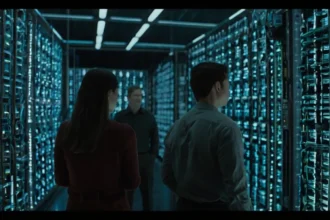Imagine a world where every decision you make creates a whole new universe—a universe where you live a different life, have different friends, and even face different adventures. Now imagine that scientists might one day be able to explore these alternate realities using the power of quantum computing, a concept often referred to as Quantum Dimensions. This idea, as wild as it sounds, is one that scientists are just beginning to consider. Could quantum computers, with their strange abilities, open doors to exploring the multiverse? Let’s dive into the world of quantum science to find out.
As far as the laws of mathematics refer to reality, they are not certain; and as far as they are certain, they do not refer to reality.
Albert Einstein
The Strange World of Quantum Mechanics
To understand how quantum computers might help us explore alternate universes, we first need to understand the basics of quantum mechanics, the science that studies the smallest particles in nature, like atoms and subatomic particles. In our everyday world, objects follow predictable rules: a ball thrown in the air will come down, and a cup of water will spill if tilted. However, at the quantum level—where particles are tiny, invisible even under a regular microscope—things get strange. Particles can exist in two places at once or spin in opposite directions at the same time!

In fact, quantum mechanics tells us that tiny particles like electrons can exist in a state of superposition, which means they can be in multiple states at once. Imagine flipping a coin, but instead of landing heads or tails, the coin is somehow both heads and tails until you look at it. This is the bizarre and fascinating world of quantum mechanics!
What is Quantum Computing?
Now that we know a little about quantum mechanics, let’s look at quantum computers. These are computers that operate based on the principles of quantum mechanics. Most computers, like the one you may be reading this on, work using bits—the basic unit of information that can be either a 0 or a 1. By combining these 0s and 1s in different ways, classical computers can store data, solve problems, and run programs.
Quantum computers, however, use something called qubits (quantum bits). Unlike regular bits, qubits can exist in a superposition of states, which means they can be both 0 and 1 at the same time! This special ability allows quantum computers to perform multiple calculations simultaneously, making them extraordinarily powerful. For example, a classical computer might take years to solve a complex problem, but a quantum computer could do it in minutes.
This power could help us solve real-world problems that are too complex for today’s computers, like designing new medicines, predicting weather patterns, or even breaking certain codes.
The Multiverse Theory: A Universe of Universes
Here’s where things get really exciting. Some scientists believe that our universe might not be the only one. There might be a multiverse—a vast collection of parallel universes that exist alongside our own. This idea, called the multiverse theory, suggests that every time a decision is made, a new universe splits off where that decision went the other way. In one universe, you might have gone to bed early, while in another, you stayed up late and discovered a new hobby.

The multiverse theory is based on the many-worlds interpretation of quantum mechanics, which proposes that all possible outcomes of a quantum event happen, each in a separate universe. So, every choice you make, no matter how small, creates new branches of reality.
How Quantum Computers Might Help Us Explore Other Dimensions
While the multiverse sounds like pure science fiction, quantum computers might be the key to studying or even understanding these alternate realities. Here’s how:
1. Simulating Alternate Universes
Because quantum computers can handle superpositions, they can theoretically simulate countless outcomes at once. This means scientists could use quantum computers to create models of alternate universes by setting different parameters or “rules” for each. For example, they might create a simulation of a universe where the laws of physics are slightly different, where gravity is stronger or weaker. By running these simulations, we could learn more about what might happen in alternate versions of reality.
Imagine having a quantum computer simulate a universe where dinosaurs never went extinct. How would life look in that world? Could humans and dinosaurs coexist? These kinds of simulations would help scientists explore “what if” scenarios and potentially understand the conditions required for life in different types of universes.
2. Quantum Parallelism: Exploring Multiple Realities at Once
Quantum computers have an incredible ability called quantum parallelism, which allows them to explore many possibilities simultaneously. While a regular computer calculates one outcome at a time, a quantum computer can consider all possible outcomes at once. This ability makes quantum computers perfect for studying the multiverse, as they can run complex calculations involving multiple dimensions.
For instance, scientists could ask a quantum computer to solve problems that apply to different universes or timelines. If they design the right algorithms, quantum computers might reveal insights about how universes could evolve under different conditions, letting us peek into the workings of other dimensions.
3. Entanglement as a Bridge Between Universes
One of the most fascinating aspects of quantum mechanics is entanglement. When two particles become entangled, they stay connected even if separated by vast distances. If you change something about one particle, the other particle “feels” it instantly, no matter how far apart they are. It’s almost like a magical connection that defies the usual rules of space and time.
Some scientists wonder if entanglement could be used to link different dimensions. Although this idea is purely speculative, it’s possible that quantum computers could use entangled particles to create a form of communication or even observation across alternate realities. Imagine if scientists could “see” into a parallel universe by manipulating an entangled particle on our side.
How Far Are We from Multiverse Exploration?
While this all sounds exciting, we are still far from having the technology or understanding needed to explore alternate dimensions. Quantum computing itself is still in its early stages. Although companies like Google, IBM, and Rigetti are making progress, quantum computers today are limited in their capabilities and are very sensitive to interference from the environment.
Quantum physics thus reveals a basic oneness of the universe.
Erwin Schrodinger
Moreover, exploring alternate realities requires solving challenges we don’t yet fully understand. How could we “see” into another universe? Would we be able to interact with it? And if we could, what would happen to our own reality?
Ethical Questions About Exploring the Multiverse
Suppose we reach a point where we can observe or even communicate with other dimensions. This achievement would come with major ethical questions. For example:
- Responsibility to Other Beings: If life exists in other universes, would we have a responsibility to respect those worlds? Would interacting with them interfere with their natural evolution, or would it be harmless?
- Privacy Across Dimensions: Could exploring other dimensions invade the privacy of beings in those worlds? How would we prevent accidental harm to other universes?
- Impact on Our Own Reality: We don’t know if interacting with another universe could have side effects on our own. What if changes in one dimension ripple into another, altering reality in ways we can’t predict?
These questions may sound like science fiction, but they are important to consider as technology advances.
The Future of Quantum Computing and Multiverse Science
So, what does the future hold? Quantum computing is developing quickly, with researchers working to make these computers more stable and powerful. Universities and companies are exploring ways to use quantum computers to solve practical problems, like medicine and environmental issues. But as quantum technology progresses, scientists may also start to investigate some of the more “out-there” possibilities, including multiverse exploration.
Institutions like Caltech are at the cutting edge of this research, pushing forward our understanding of the universe and quantum mechanics. While no one knows for sure if we will ever be able to explore alternate dimensions, the pursuit of knowledge often leads us to surprising places. After all, humanity once thought that reaching the moon was impossible!
Breaking down the barriers
The idea of using quantum computers to explore alternate dimensions might seem far-fetched, but it’s grounded in real science. Quantum mechanics and quantum computing are showing us a world of possibilities we never dreamed of, and scientists are only beginning to understand the potential of these technologies. The dream of exploring the multiverse might be closer than we think.
For now, quantum computing is like a powerful magic tool that we’re still learning how to use. But who knows? Perhaps in the not-so-distant future, we’ll be able to look into other dimensions or even take a peek at the countless versions of reality that exist in the multiverse. Until then, we can only imagine the endless adventures waiting for us in the quantum dimensions of the cosmos.
Must Visit : Home Quantum – februaryToEnd











